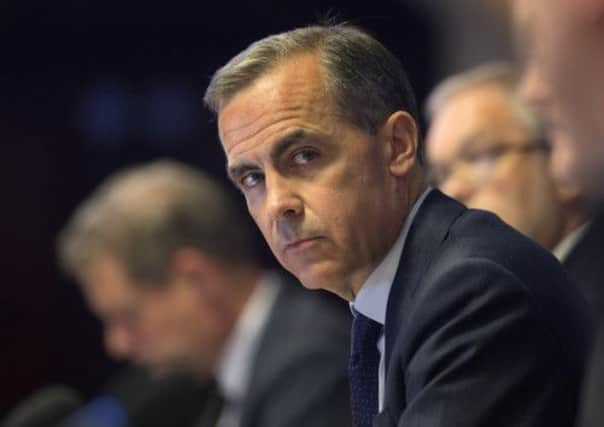George Kerevan: Central bankers and politics


His job was to ensure that inflation was squeezed out of the economy by raising interest rates whenever banks lent consumers too much on their credit cards, or funded speculative property developers. If inflation was under control, the theory went, business would have the confidence to invest and create jobs.
Somewhere around the Millennium, all that began to change. First, the then boss of the US central bank, Gordon Brown’s mate Alan Greenspan, decided that inflation had been abolished by the arrival of the internet. He opined that PCs and the World Wide Web had created such a huge surge in productivity in America that goods could be produced faster than consumers could buy them, removing the pressure on prices.
Advertisement
Hide AdAdvertisement
Hide AdWith the inflation dragon seemingly slain, Greenspan slashed US (and therefore world) interest rates to rock bottom. Unfortunately, this cheap credit triggered surging house and oil prices, plus a massive consumer boom. Banks lent like there was no tomorrow, especially to each other.
Here in the UK, we were a little late arriving at Greenspan’s party. The Bank of England – which had been given authority over interest rates by Gordon Brown – stuck to its traditional view that too much money chasing too few goods was a Bad Thing, as it would lead to inflation. Governor “Steady” Eddie George, the brilliant son of a London postal clerk, happily raised interest rates a notch when he felt it necessary.
When Eddie George retired in 2003, Gordon Brown quickly installed the pliable Mervyn King as governor. It was all very well giving the Bank control over interest rates – but only if it did as Gordon told it. When house prices started shooting up in 2005, King was prevailed upon to cut interest rates – the opposite of what Steady Eddie would have done. Barely two years later came the bank run on Northern Rock, followed by the meltdown at RBS and HBOS the following year.
You might have thought that the near collapse of the US and British banking systems in 2008 would have cured politicians of installing activist central bank governors who are seduced into promoting growth over sound money. You might have concluded there would be a return to the traditional model of a central banker who keeps out of politics and sticks to the job of keeping inflation at bay. And, of course, you’d be wrong.
On Wednesday, Mervyn King’s replacement as Governor of the Bank of England held a press conference to announce Britain’s new economic policy. He is Canadian Mark Carney, a George Clooney look-alike who was personally headhunted by Chancellor George Osborne. Carney explained (very politely) that he was, in effect, tearing up the Bank’s traditional approach to monetary policy. Inflation was no longer the only, or even the main, policy benchmark. Instead it is unemployment.
In a nutshell, interest rates will be kept at near zero until unemployment falls below 7 per cent – which would require 750,000 new jobs. Ostensibly, the aim of this “forward guidance” is to provide business with the confidence to invest now, boosting growth. And by the by, it takes the pressure off Chancellor Osborne as he struggles with budget austerity. Which, of course, is why the Canadian was hired.
Carney proceeded to confuse the attendant media by qualifying this unemployment rule somewhat. Basically, if inflation goes up too much he will have to raise rates. However, I suspect this get-out clause is window dressing to pacify the hawks on the Bank’s rate-setting monetary policy committee.
Does “forward guidance” get us anywhere? My guess is not as far as Mr Carney thinks. Effectively, the Bank has favoured economic growth over inflation since the economic crisis of 2008. Mr Carney has only made explicit what was implicit. The markets know this, which may explain why there was little reaction in the City to Carney’s announcement.
Advertisement
Hide AdAdvertisement
Hide AdIt is difficult see where those 750,000 new jobs are going to come from in a hurry, if Chancellor Osborne continues with his austerity programme. That leaves only one method of adding to demand: the Bank of England’s programme of “quantitative easing”. The Bank has pumped £375 billion of new money into the banking system in the hope it will be lent to consumers and firms. But most of it remains locked away in bank reserve deposits because the Government has also ordered the banks to boost their capital in case of another crisis.
The other problem with relying on “forward guidance” as a panacea is that market and business confidence in the UK is dependent on what happens overseas, which is outside the control of the Bank of England.
The minute the US central bank signals the end to its own programme of quantitative easing, interest rates will shoot up everywhere regardless of Mark Carney’s wishes. America gets a new head for its central bank, the Federal Reserve, next January. Watch that space.
Nor should we feel too comfortable about the Bank relaxing its vigilance regarding inflation. The more lax the Bank of England was about inflation under Mervyn King, the more real household incomes eroded. But this actually reduced consumer demand and hampered recovery.
I distrust Carney’s new unemployment target, which I think plays to a political agenda. I’d prefer the Bank to target nominal GDP (ie growth uncorrected for the rate of inflation). If nominal GDP growth is faster than average it indicates inflation, so you raise interest rates. If nominal GDP is slower than average it indicates recession, so you cut rates. That way you combine a sensible growth target with keeping tabs on inflation.
The lesson of history is that central bankers must keep their distance from politicians. Central bankers get paid to be unpopular because occasionally they have to take people’s sweeties away. Is Mark Carney prepared to be unpopular, when the time comes?